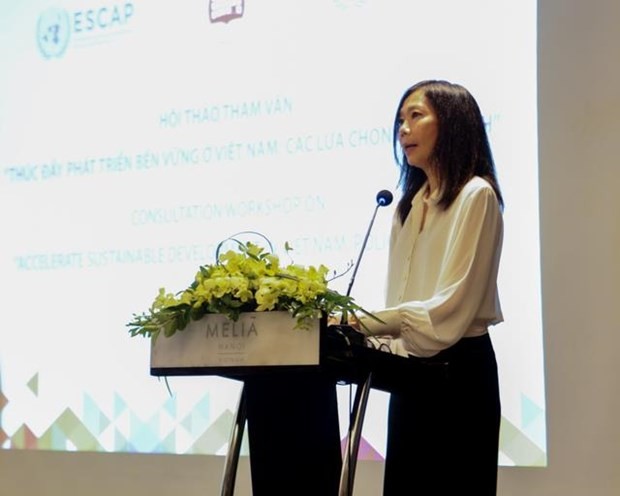
Consultation discusses policy choices to promote sustainable development
Latest
 |
| UN Resident Coordinator in Vietnam Pauline Tamesis speaks at the workshop in Hanoi on December 14. (Photo: Government e-newspaper) |
The workshop aimed to improve the awareness of development challenges and opportunities of Vietnam, discuss policy choices to help the country reach the Sustainable Development Goals (SDGs), and better the specialised capacity of Government agencies’ staff in making macro-economic analyses and assessments of economic, social, and environmental aspects of the development process.
Le Viet Anh, Director of the MPI’s Department of Science, Education, Natural Resources and Environment, said that to realise the SDGs, boost green transition, and achieve net zero emissions by 2050, the Vietnamese Government has issued many policies and investment commitments on different fields such as stepping up the implementation of the three national target programmes on sustainable poverty reduction, new-style countryside building, and socio-economic development in ethnic minority areas.
Besides, it has also been accelerating energy transition by approving the eighth National Power Development Plan, which includes ambitious targets on clean and renewable energy, implementing the Political Declaration on establishing the Just Energy Transition Partnership (JETP), and fostering digital transformation and the application of scientific and technological advances, he noted.
UN Resident Coordinator in Vietnam Pauline Tamesis said the country has made great strides in improving living standards and lifting millions of people out of poverty.
Basing on these attainments, she went on, Vietnamese leaders set the targets that the country will become a high-income nation by 2045 and secure net zero emissions by 2050. This vision is promoting Vietnam’s implementation of commitments to carry out the 2030 Agenda for Sustainable Development and the SDGs.
The second voluntary national review, delivered by MPI Minister Nguyen Chi Dung at the high-level political forum last July, outlined six policy priorities and recommendations for accelerating the realisation of the SDGs.
Those priorities comprise promoting science, technology and innovation; developing quality human resources; efficiently managing resources, adapting to and mitigating climate change, and building green and circular economy; finance; data readiness; and putting people at the centre of every decision, policy, and action.
Tamesis held that these priorities highly match the six transformations to achieve the SDGs agreed by member countries at the SDG Summit.

















